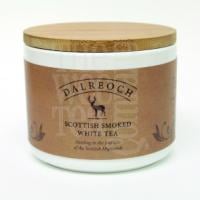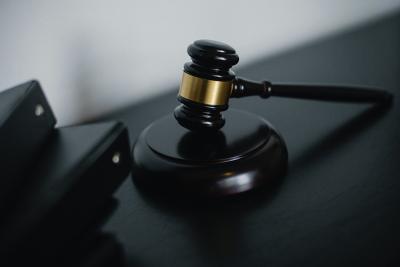Thomas Robinson’s biggest mistake was showing too much of his tea farm in Scotland. His tale was plastered all over the media as a success story, paired with accolades. Luxury hotels like the Balmoral in Edinburgh and The Dorchester in London contracted with him for their afternoon-tea service, expecting nothing short of the best. He also sold tea plants to aspiring tea growers, claiming they would flourish in Scotland’s climate.
Robinson, 55, who also goes by Tam O’Braan, continued the romanticism of growing tea in Scotland by inviting people to visit the farm (The Wee Tea Plantation), meet the farmer, and see the tea plants for themselves. He gave his teas special names—Scottish Antlers Tea, Silver Needles and Highland Green—to further evoke the Scottish countryside.
“I had heard about Wee Tea because I had seen a news article about it, in the BBC, about this chap who was growing tea in Scotland and had been awarded some sort of tea award for his tea,” says P.M. David Silva & Sons’ managing director, Dananjaya Silva. “[There was] a picture of him in a field, and he’d been filmed saying this is his tea plantation and this is the tea that he made. I was very skeptical because when I looked at the video, the tea plants were very young. They were not in a state where you could pick from them to get the quantity of tea he was making.”
On June 25, after a three-week trial, Robinson was sentenced to 3.5 years at Stirling Sheriff Court in Stirling, Scotland. His crime: Two counts of fraud for orchestrating a fraudulent £550,000 tea-growing scheme since 2014. Turns out, those tea plants were imported from Italy and bought from a wholesaler—not grown in Scotland as he’d claimed.
What Robinson didn’t open up for viewing by the public was his production, the less interesting and certainly more gritty part of a tea business.
To tea drinkers, nothing seemed off, but fellow tea growers, upon seeing photos of his plants, immediately knew this was a fraud. There was simply no way that his plants were not only mature enough but could supply his production claims. He had to have gotten them from somewhere else.
“It’s preying upon people that really didn’t understand horticulture or agriculture,” says Jason McDonald, co-founder with Timmy Gipson of The Great Mississippi Tea Company in Brookhaven, Mississippi, which grows and processes tea in the Magnolia State. “He had a great media campaign of giving general and vague facts.”
In 2018, Beverly-Claire Wainwright was at a tea estate in Sri Lanka when Robinson contacted her. As a well-known consultant with Scottish tea growers, he sought her advice. But some things were not adding up—and she wasn’t the only one who thought this.
“Some of the things that he was claiming made me very suspicious,” she says. “The [Scottish] growers were complaining to me about him but nobody wanted to report him because they were worried about their reputation. They hoped it would go away, but it wasn’t because he’s a serial fraudster. There was going to be another person who he was going to con.”
When she returned to the U.K., Wainwright reported him to Food Standards Scotland, an organization where she was already a consultant. For Robinson’s case, she produced tea samples from various Scottish growers for ionomics testing, as evidence. “There isn’t very much tea being grown in Scotland, but there is some,” says Wainwright. “I felt there needed to be integrity. He tarnished the reputation of anything that was being done.”
The trial also cast a light on the harsh realities of growing and harvesting tea.
Among the expert witnesses was McDonald, who planted his tea gardens 13 years ago, in a region just as marginal as Scotland. “When I got into tea, I thought it was easy too,” says McDonald. But the reality proved to be anything but: “115-degree heat index, and you’re out plucking tea,” he says.
By consulting evidence—from pictures to podcasts—he was asked to comment on Robinson’s claims about his production levels. “We have a 1,500-plant plot where we did some prototype trials for harvest a few years back, so we’ve kept a lot of data. He reportedly had a few thousand plants,” says McDonald. “The conclusion was that there was no other way possible for him to have sold as much tea as he had without bringing it from somewhere else.”
Post-verdict, it will take a lot to bring credibility back to tea growers. With Robinson’s case in the news, consumers and retailers could be skeptical. “I think that he’s devastated the reputation of garden tea growing,” says McDonald. “There needs to be transparency in the supply chain of tea.”

Wainwright continually fields calls and emails from people who want to plant and harvest tea plants in Scotland, thinking they’ll become rich and live a romantic life as a farmer. But the reality is far from it. This is what made her and Scottish tea growers angry about Robinson: He was making the job look easy and akin to a cash cow.
“Nobody ever publishes the figures and the facts [about growing tea], and it hooks people in. Let’s not lure people in,” she says. “Unless you are rich, you need to have money and you need to own land and have deep pockets. You need to have money that you can afford to lose if you are growing tea in marginal conditions.”
What buyers of tea, whether at the consumer level or wholesalers, should do is examine tea growers with their eyes open—ask questions and be curious. “Particularly in new and emerging markets, people don’t understand how tea is made,” says Wainwright. “It’s very easy for people to be duped. You should be able to see their processing equipment. If somebody cannot show you their processing room and equipment, do not buy their tea. If someone can’t tell you how many plants they have, do not buy their tea.”
Robinson’s saga has harmed the reputation of other tea growers, including third-generation family tea grower P.M. David Silva & Sons, in Sri Lanka, which was considered by the Balmoral as a potential tea supplier, until Robinson was chosen instead. “We concentrate on providing tea for luxury hospitality and hotels,” says Silva. “That’s very much our bread and butter.” A few years ago, a pot of their tea in London was sold for “$500 a pop,” he says, and their tea is sold at the Windsor Farm Shop, previously owned by the royal family, as well as at Harrods. Along those lines, P.M. David Silva & Sons provides hotels’ food and beverage managers with training in tea, by bringing them to their farms in Sri Lanka.
“The reason why we have that program is mainly for transparency, to show them that this is the work that goes into making this product,” he says. “Part of making great tea is drinking it but also understanding the story behind it: What makes a particular tea special?”
In pitching the Balmoral Hotel, as part of the proposal, Silva showed them a video of another tea supplier that had visited their plantations and taken its University of Tea course designed for tea professionals.
When Silva found out his company did not get the contract, he pressed for more details and was shocked that Robinson was chosen because he was a “local” company. “To lose out to someone who has made an entire story about nothing more than a work of fiction, like a Harry Potter book really, it’s hard to take,” he says. “I said, ‘Look, there’s absolutely no way he can provide the tea you need for your afternoon tea operation, let alone the whole hotel.’ It’s tarnished their reputation, but on the good side of things, it has exposed this great underbelly of the tea industry.”

McDonald agrees—which is why he didn’t hesitate to be an expert witness in Robinson’s trial. “You end up with these characters and it’s kind of up to us to call them out,” says McDonald.
That includes the media, says Wainwright, and its earlier glowing coverage of Robinson. “The media did a poor job because they didn’t check anything. He claimed to have won a lot of awards, but they were completely fake,” she says. “Why didn’t tea journalists ask him the right question? Why didn’t they ask to see his processing equipment?”
Still, even with the charge, many victims lost out on a lot of money, including luxury hotels, tea shops, and other vendors who bought tea from Robinson, assuming his claims were legit.
“I hope there’s restitution,” says McDonald. “There’s a lot of people out of a lot of money. Everybody who purchased that tea, thinking it was Scottish tea … Everybody in that chain of events was victimized.”
Plan to Attend or Participate in the 2026 World Tea Expo, March 23-25, 2026, Las Vegas, Nevada.
To book your sponsorship or exhibit space at World Tea Expo, or to inquire about advertising and sponsorship opportunities at World Tea News, contact:
Ellainy Karaboitis-Christopoulos, Business Development Manager, Questex
Phone: +1-212-895-8493; Email: [email protected]
Looking for professional tea education, certifications, and more? Visit World Tea Academy and register for courses today!
Also, be sure to stay connected with World Tea Expo on social media for details and insights about the event. Follow us on X, Facebook, Instagram and LinkedIn.
